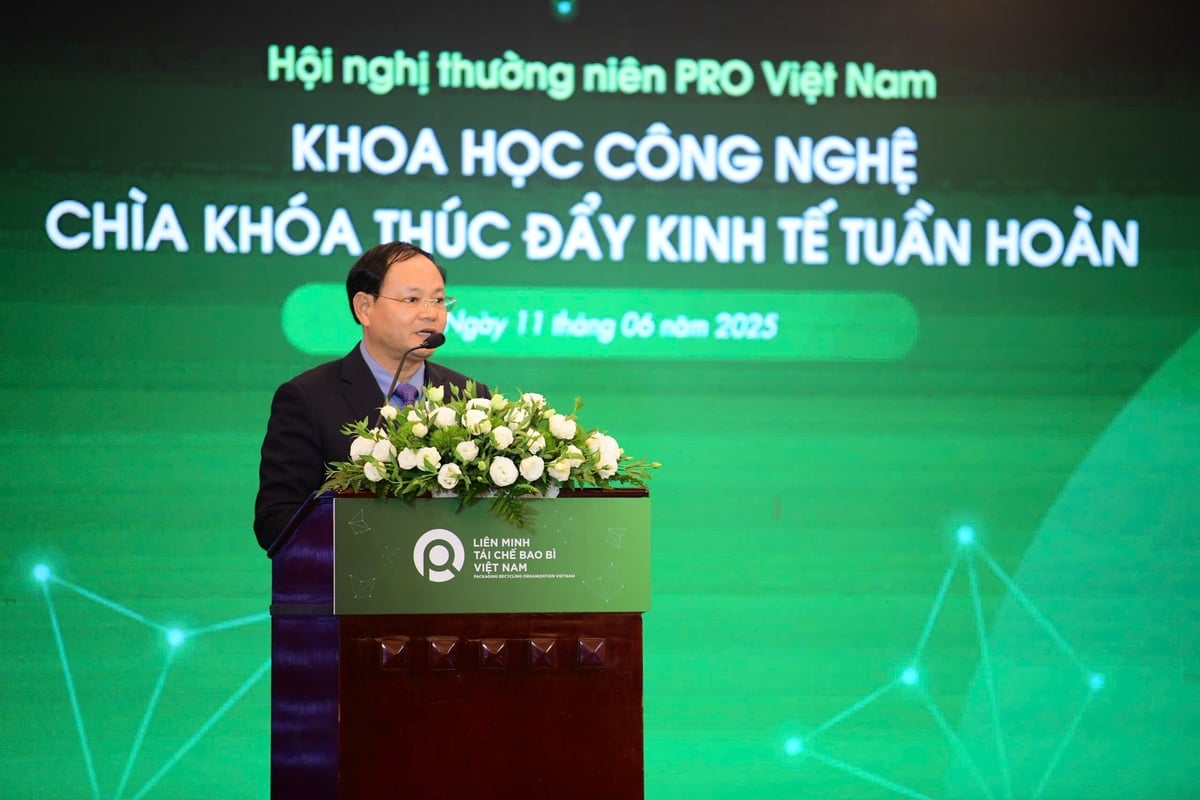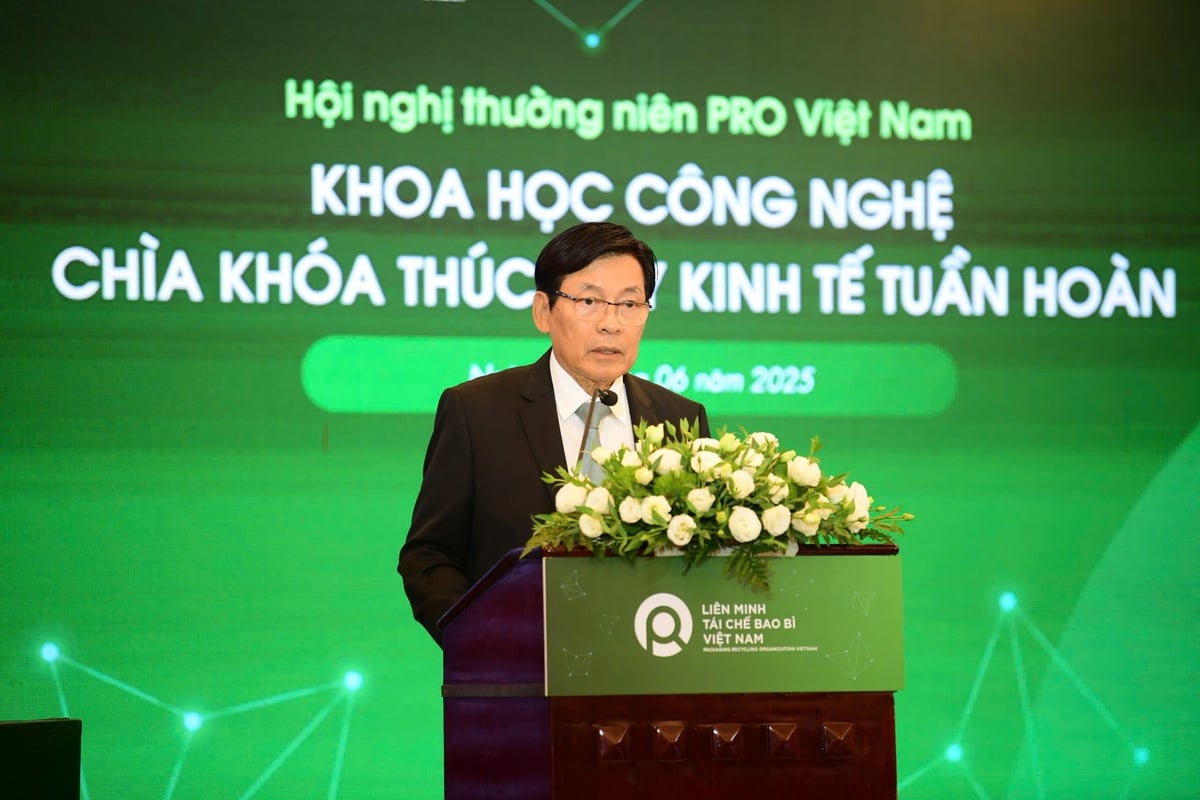November 5, 2025 | 23:20 GMT +7
November 5, 2025 | 23:20 GMT +7
Hotline: 0913.378.918
November 5, 2025 | 23:20 GMT +7
Hotline: 0913.378.918

Deputy Minister of Agriculture and Environment Le Minh Ngan spoke at the conference. Photo: Quang Dinh.
At the 2025 PRO Vietnam annual conference, Mr. Le Minh Ngan – Deputy Minister of the Ministry of Agriculture and Environment – affirmed that the Environmental Protection Law 2020 is a revolutionary legal milestone, marking the first time the circular economy model was institutionalised in Vietnam. According to him, this is not merely a change in waste management, but a transformation in how the entire production–consumption chain is perceived and organised.
“The law sets clear requirements for solid waste segregation at source, charges waste fees based on weight, and applies extended producer responsibility (EPR) to promote recycling. These are important mechanisms to extend product life cycles and alleviate environmental pressure,” Mr. Ngan emphasised.
Alongside the legal framework, the Deputy Minister highlighted that Politburo Resolution 57‑NQ/TW has identified science, technology, innovation and digital transformation as “the best opportunity for Vietnam to rise as a developed, powerful nation”.
In particular, the circular economy development scheme approved by the Prime Minister in 2022 sets the following targets: by 2025, recycle 85 % of plastic waste generated; by 2030, collect and treat 100 % of urban organic waste and 70 % in rural areas. These goals can only be achieved through investment in modern recycling technologies, low‑emission technologies, artificial intelligence and the Internet of Things, which boost forecasting, control and circular operations.
According to Deputy Minister Ngan, effective implementation requires not only businesses but also close collaboration with research institutes, universities and the international community to build highly applicable circular models.
“The business community, sectors across Vietnam in general, and the Packaging Recycling Organisation Vietnam (PRO Vietnam) in particular, should continue to join hands and collaborate with the Government, the Ministry of Agriculture and Environment in environmental protection, as well as accelerate transformation and innovation in production technology in an environmentally friendly direction, apply the achievements of science, technology, innovation and digital transformation to minimise waste emission, recycle waste and intensify circular economy, contributing effectively to the implementation of Politburo Resolution 57‑NQ/TW”, Deputy Minister Le Minh Ngan expressed.

Mr. Pham Phu Ngoc Trai, Chairman of PRO Vietnam, emphasized the importance of connecting the "three pillars", government, businesses, and research institutions, in developing the circular economy. Photo: Quang Dinh.
Not stopping at orientation, many enterprises have realised circular economy through technology investment. At TH Group, high technologies are applied across the value chain, from farm to factory to distribution network. Cow manure is treated biologically, wastewater is reused thanks to Dutch technology, and post‑consumer packaging is collected at points of sale for recycling into a second life for the material.
For example, at TH’s dairy farm in Nghia Dan, Nghe An, advanced technological solutions are fully integrated: a sensor system monitors the health of each cow; One1 and RationAll software developed in Israel is used to design optimal feed rations, ensuring nutrition while reducing excess and indirectly cutting methane emissions.
At the TH dairy processing plant, equipment from Siemens, Grundfos and Tetra Pak is operated under the principle of “resource optimisation, minimal emissions”. Technologies for water recirculation, waste‑heat recovery and automatic electricity consumption control help save tens of percent in energy and reduce water use per litre of milk.
A distinctive feature of TH’s model is that the loop does not stop at the factory. Post‑consumer packaging is collected back at its system of stores and supermarkets, then recycled to produce second‑life products. TH is one of the first enterprises to proactively and systematically implement EPR policy, from smart packaging design to organising collection and recycling.
This model not only helps TH reduce waste handling costs and increase resource efficiency, but also contributes to building a sustainable corporate image in the eyes of consumers. In an era when consumers are increasingly concerned about product origin and journey, a glass of TH fresh milk is not only the result of farming, but also proof of a closed loop, a “green” lifecycle from start to finish.
Not only limited to policy, the circular journey is being realised through concrete models, with many businesses pioneering technology‑based value chains that close the product lifecycle.
According to Mr. Pham Phu Ngoc Trai – Chairman of PRO Vietnam, in order for the circular economy to be deployed extensively, the prerequisite is “linking the three houses: state, business, academia” to form an integrated ecosystem from policy to technology capacity and implementing human resources.
To promote applied research programmes, technology transfer and training workforce for the circular economy, PRO Vietnam has signed a cooperation agreement with Vietnam National University Ho Chi Minh City.
“This linkage will open up a real innovation space, helping businesses access scientific knowledge, update recycling technology and design smart packaging according to environmental standards”, Mr. Pham Phu Ngoc Trai emphasised.
Translated by Huong Giang
/2025/11/05/0736-1-160236_10.jpg)
(VAN) Deputy Minister Le Cong Thanh welcomed the Hanoi Initiative as an urgent action toward building a smart and resilient water governance system.

(VAN) Hai Phong launches an action plan to counter IUU fishing, striving for sustainable fisheries and removal of the EC’s 'yellow card.'

(VAN) For the past 40 years, MAB Viet Nam has accompanied and supported World Biosphere Reserves (WBRs) in its efforts to promote nature conservation in harmony with socio-economic development and the preservation of cultural values.

(VAN) Promoting twin transformation — digitalizing processes and greening production to enhance Vietnamese enterprises' productivity and develop sustainably.

(VAN) Low-emission production and the conditions for granting a ‘low-emission’ label for agricultural products were among the key topics addressed by the Ministry of Agriculture and Environment at the 2025 ‘Listening to Farmers’ Forum.

(VAN) The meeting took place as Viet Nam-Australia Comprehensive Strategic Partnership continues to thrive, with both sides strengthening cooperation in agriculture, trade, and technology.

(VAN) Quang Ngai is promoting the application of digital technology to expand markets for OCOP products and enhance product quality.